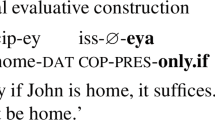Abstract
Predicate approaches to modality have been a topic of increased interest in recent intensional logic. Halbach and Welch (Mind 118(469):71–100, 2009) have proposed a new formal technique to reduce the necessity predicate to an operator, demonstrating that predicate and operator methods are ultimately compatible. This article concerns the question of whether Halbach and Welch’s approach can provide a uniform formal treatment for intensionality. I show that the monotonicity constraint in Halbach and Welch’s proof for necessity fails for almost all possible-worlds theories of knowledge. The nonmonotonicity results demonstrate that the most obvious way of emulating Halbach and Welch’s rapprochement of the predicate and operator fails in the epistemic setting.
Similar content being viewed by others
References
Bello, M. D., Epistemic closure, assumptions and topics of inquiry, Synthese 191(16): 3977–4002, 2014.
Belnap, N., and A. Gupta, The Revision Theory of Truth, MIT Press, Cambridge, 1993.
Birkhoff, G., Lattice Theory, 3rd edn., American Mathematical Society, Providence, 1967.
Chellas, B. F., Basic conditional logic, Journal of Philosophical Logic 4(2):133–153, 1975.
Cross, C., The paradox of the knower without epistemic closure, Mind 110(438):319–333, 2001.
Cross, C., The paradox of the knower without epistemic closure—corrected, Mind 121(482):457–466, 2012.
Dretske, F., Epistemic operators, The Journal of Philosophy 67(24):1007–1023, 1970.
Dretske, F., The pragmatic dimension of knowledge, Philosophical Studies 40(3):363–378, 1981.
Egre, P., The knower paradox in the light of provability interpretations of modal logic, Journal of Logic, Language and Information 14(1):13–48, 2005.
Halbach, V., Axiomatic Theories of Truth, Cambridge University Press, Oxford, 2011.
Halbach, V., and P. Welch, Necessities and Necessary Truths: A Prolegomenon to the Use of Modal Logic in the Analysis of Intensional Notions, Mind 118(469):71–100, 2009.
Hawke, P., Relevant alternatives in epistemology and logic, in J. Redmond, O. Pombo Martins, and A. Nepomuceno Fernández, (eds.), Epistemology, Knowledge and the Impact of Interaction, Springer, 2016, pp. 207–235.
Heller, M., Relevant alternatives, Philosophical Studies 55(1):23–40, 1989.
Heller, M., Relevant alternatives and closure, Australasian Journal of Philosophy 77(2):196–208, 1999.
Holliday, W. H., Epistemic Closure and Epistemic Logic I: Relevant Alternatives and Subjunctivism, Journal of Philosophical Logic 44(1):1–62, 2015.
Horsten, L., The Tarskian Turn, The MIT Press, Cambridge, 2011.
Kaplan, D, and R. Montague, A paradox regained, Notre Dame Journal of Formal Logic 1(3):79–90, 1960.
Kripke, S., Is there a problem about substitutional quantification?, in The Ways of Paradox and Other Essays, Oxford University Press, 1976, pp. 324–419.
Lewis, D., Elusive knowledge, Australasian Journal of Philosophy 74(4):549–567, 1996.
Maitzen, S., The knower paradox and epistemic closure, Synthese 114(2):337–354, 1998.
Montague, R., Syntactical treatments of modality, with corollaries on reflexion principles and finite axiomatizability, in R. H. Thomason, (ed.), Formal Philosophy: Selected Papers of Richard Montague, chap. 10, Yale University Press, 1963, pp. 286–302.
Montague, R., Formal Philosophy: Selected Papers of Richard Montague, Yale University Press, New Haven, 1974.
Nozick, R., Philosophical Explanations, Harvard University Press, Cambridge, 1981.
Priest, G., An Introduction to Non-Classical Logic, Cambridge, 2008.
Pritchard, D., Sensitivity, safety, and anti-luck epistemology, in J. Greco, (ed.), The Oxford Handbook of Skepticism, Oxford University Press, Oxford, 2008, pp. 437–455.
Quine, W. V., Three grades of modal involvement, in The Ways of Paradox and Other Essays, Random House, 1966, pp. 156–174.
Schwarz, W., Variations on a montagovian theme, Synthese 190:3377–3395, 2013.
Steup, M., and E. Sosa, Contemporary Debates in Epistemology, Blackwell Publishers Inc., Malden, 2005.
Tarski, A., A lattice-theoretical fixpoint theorem and its applications, Pacific Journal of Mathematics 5(2): 285–309, 1955.
Uzquiano, G., The paradox of the knower without epistemic closure? Mind 113(449): 95–107, 2004.
Williamson, T., Knowledge and Its Limits, Oxford University Press, Oxford, 2002.
Xu, Z., and B. Chen, Epistemic logic with evidence and relevant alternatives, in Jaakko Hintikka on Knowledge and Game-Theoretical Semantics, Springer, 2018, pp. 535–555.
Acknowledgements
I would like to thank Sean Walsh, David Woodruff Smith, Kai Wehmeier, and Brian Skyrms. Early versions of this work were presented at the following events: The Predicate Approaches to Modality Conference at the Munich Center for Mathematical Philosophy, LMU Munich, in September 2014; the C-ALPHA Logic Seminar, UC Irvine, in Winter 2016. I am grateful to the audiences for their responses. Thanks is owed in particular to the following people who gave me invaluable feedback and comments on these and other occasions: Tim Button, Volker Halbach, Greg Lauro, Richard Mendelsohn, Jeff Schaz, Johannes Stern, and Philip Welch.
Author information
Authors and Affiliations
Corresponding author
Additional information
Presented by Richmond H. Thomason
Rights and permissions
About this article
Cite this article
Banick, K. Epistemic Logic, Monotonicity, and the Halbach–Welch Rapprochement Strategy. Stud Logica 107, 669–693 (2019). https://doi.org/10.1007/s11225-018-9811-y
Published:
Issue Date:
DOI: https://doi.org/10.1007/s11225-018-9811-y




